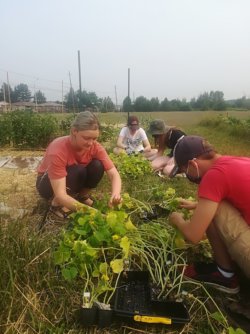Sudbury Shared Harvest transforms mentorship through gardening
Research shows that relationships, including those with mentors, play a critical role in positive youth outcomes. In order to create a transformative outcome for a young mentee, the mentor must carefully build trust through empathy, respect and structure.
January is National Mentoring Month, a time to share, discuss, and celebrate new evidence-based strategies and practices for mentoring programs. Sudbury Shared Harvest has been putting those best practices into action through their Youth Agricultural Mentors (YAM) program.
Operating since 2021, the program supports young people in developing a greater sense of connection with themselves and one another through gardening and farming. They also receive guidance from mentors with a variety of skills from biology to architecture, participants learned about plant identification, cooking, marketing, propagation and more.
“Mentorship is everything,” said Kryslyn Mohan, YAM program co-lead, “As mentors to this group, we learnt so much from them. We also learnt about ourselves, through being a mentor. The program would not be able to have such an impact without the relationships created along the way.”
 As part of the program goals, they note that growing food for and with others is a great way to feel connected to the community. Participants also learned from multiple community mentors who shared knowledge during interactive workshops for youth, such as building their own worm bin and how to identify mushrooms.
As part of the program goals, they note that growing food for and with others is a great way to feel connected to the community. Participants also learned from multiple community mentors who shared knowledge during interactive workshops for youth, such as building their own worm bin and how to identify mushrooms.
YAM participants learn how to grow food in a way that works with nature rather than against it. They learn regenerative agriculture practices like composting, integrated pest management, planting pollinator plants, and more. Kryslyn says the idea is to garden in a way that helps to protect the organisms in the ecosystem including the organisms under our feet in the soil.
“Many young people are becoming more motivated to act, and learning how to grow our own food in a way that helps nature to restore balance can help alleviate the eco-anxiety so many are feeling because of the state that the planet is in, [so] learning to grow food is empowering.” says Kryslyn.
As we know, mentorship is not a one-way street, and Kryslyn agrees. They are even looking to create a mentor role for past graduates of the program to encourage the passion participants had for learning from one another will expand and grow within the school, community, and beyond.
They received glowing feedback from participants such as feeling a sense of belonging and being able to open up to others. Sudbury Shared Harvest says the program helped with their confidence as workers, by having the ability to finish a job will help them in the long-term when they are given tasks and assignments in the workforce.
The organization hopes to continue refining the program and creating more paid youth opportunities in regenerative agriculture. Learn more about Sudbury Shared Harvest and YAM.


